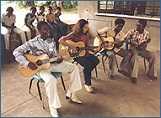Peace Corps Led Helen Perry to International Health Career

Helen Perry is a training specialist and team leader for Integrated Disease Surveillance and Response in the African region. She’s been at CDC ten years. She served in the Peace Corps in Morocco from1965 to 1967. "I joined the Peace Corps because I wanted a service opportunity, I had an adventurous spirit, I was a good language learner, and I was inspired by the idealism of the early 60s."
Perry worked in a provincial hospital laboratory in Meknes, Morocco, and in a TB hospital in Rabat, Morocco. "In Meknes, I worked in the microbiology, blood banking, and public health water testing ‘departments.’ At the TB hospital, we performed microscopy and cultures."
She got into public health because of her husband, Sam Perry who recently retired from CDC after 34 years. "I married Sam in 1966 while we were still in Peace Corps in Morocco. In addition to his domestic posts with CDC, Sam also had several overseas assignments (the former Zaire, Nepal, and India) where we spent more than 15 years and raised our family. Public health was the narrative that surrounded our life story and we grew up in the business with many wonderful friends and folks who went on to become outstanding public health leaders. I was lucky to get to know and learn from all of them. While our children were being raised, and while we were overseas, I was an educator and taught English, science and languages. When we returned definitively to the US, I started working as a training developer for WHO global health programs. Then I came to CDC."
Perry says she recognizes many Peace Corps experiences as relevant to her job today, "including the need to practice cultural sensitivity and the need to use what you have at hand to get the job done. You just try to make it happen even if you don´t have the latest bells and whistles. Also, I think my grassroots experience of working in local laboratories and health centers helps me to keep in mind the strengths and limitations experienced by our colleagues at all levels in our partner countries in Africa and Asia."
She recalls, "We used to have a midday break when I worked in the lab in Morocco. We would work from 7:30 a.m. -12:30 p.m. and then return from 3:30 to 6:30 p.m. I still miss taking a midday nap!"
Perry says working in another culture takes patience. "One needs to spend time with people in their own context and work side by side with them. It can be on a routine task, or on some special problem. But the point is to be there and to share in the consequences. Things may not move as quickly or as smoothly as one would like, but the important thing is to share the experience (good or bad) with folks in their own time frame. I also think it takes respecting the different processes and conditions that different settings present and accepting that you don´t always have all the answers. You have to be willing and open to having your own assumptions, sensations and world view challenged and questioned almost daily."
She speaks French and has also studied Spanish, Italian, Moroccan Arabic and Lingala.
- Page last reviewed: January 7, 2015
- Page last updated: January 7, 2015
- Content source:
Global Health
Notice: Linking to a non-federal site does not constitute an endorsement by HHS, CDC or any of its employees of the sponsors or the information and products presented on the site.


 ShareCompartir
ShareCompartir